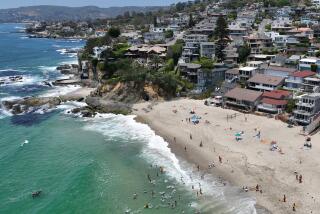Hoteliers Propose Bed-Tax Hike to Pay for Visitors Bureau
REDONDO BEACH — Faced with declines in occupancy and an impending 50% increase in the number of rooms, hotel managers want to increase the city’s bed tax to pay for a visitors bureau that would entice more tourists.
“It’s in reaction to the fact that our occupancy is down in every hotel in Redondo Beach,” said Mary Alice Bashford, general manager of the Best Western Redondo Beach Inn and coordinator of the effort.
Occupancy has decreased about 10% at the Best Western and other hotels since last year, she said. The main goal of the visitors bureau, however, would be to promote the city, not an individual hotel, she said. “I feel this is not only good for the hotels, it’s good for the city. Visitors bureaus can produce a lot of city pride.”
For every dollar spent in a hotel, $3 is spent in nearby businesses, she said.
A majority of the City Council members and Mayor Barbara J. Doerr said they support the formation of a visitors’ bureau and would likely approve the increase sought by the hoteliers, which would increase the tax from 7% to 9%.
City Manager Timothy Casey, however, expressed doubts that the increase would be approved by the two-thirds majority of the voters required by Proposition 13.
The proposal, which was developed by representatives of the Best Western Redondo Beach Inn, Best Western Sunrise hotel, Palos Verdes Inn, Portofino Inn, Starlite motel, Seaside motel and Budget 6 motel, calls for the bureau to be run by a seven-member governing staff consisting of a representative from each of the five hotels with more than 100 rooms, one representative for smaller motels and a Chamber of Commerce representative.
Bashford presented the proposal to the council this week with letters of support from owners and managers of the Sunrise, Palos Verdes, Portofino and Starlite.
By increasing the bed tax, visitors and tourists--not residents--would be paying for the bureau, Bashford argued.
But according to City Manager Casey, David Cocks, general manager of the Sheraton hotel that is scheduled to open across from King Harbor in January, has said Redondo’s 7% bed tax gives its hotels a marketing advantage because the tax in nearby cities is 8% to 10%. Cocks, who could not be reached for comment, has not studied the proposal in detail, Casey said, but tended to oppose a tax increase.
Bashford said Cocks’ hotel, which will be the largest hotel in the city with the biggest convention facilities, has the most to gain by attracting more overnight visitors. “I feel everybody else has been here and we know what we’re facing. He’s the new kid on the block,” Bashford said.
Councilwoman Marcia Martin said, “The Sheraton, let’s face it, carries a lot of weight. They have a 350-room hotel opening in January.” She said she is undecided on whether a visitors bureau is needed.
The city has 650 hotel and motel rooms, Casey estimates, and another 150-room inn is planned for King Harbor. No construction date has been set, but the plans have city approval.
“With the number of hotels that are being developed at this time, I think it’s incumbent upon us to attract tourists to our city, especially since we’re in dire competition with cities all over the country,” said Councilwoman Kay Horrell.
Casey said there are better alternatives to the proposed visitors bureau. The city, the Chamber of Commerce and the various pier and harbor associations have some tourism and promotional programs now that overlap, Casey said, and he is worried that an independent bureau might further duplicate efforts.
The chamber tends to promote businesses within the area, while a visitors bureau would try to attract tourists and conventions from across the country, said Ernie O’Dell, executive director of the Redondo Beach Chamber of Commerce. He said he has not analyzed the proposal, but “anything that promotes Redondo Beach would be beneficial.”
Casey suggested that a benefit assessment district be formed under the state Parking and Business Improvement Area Law of 1979. The law allows such a district to be formed to benefit businesses in the area if a majority of the business interests approve, he said.
For example, the hotels and motels could be assessed 2% of their general revenue to fund the district, he said. Such an assessment would not require voter approval, but would generate the same revenue, he said. An advisory board, which could be made up of the businesses, would make recommendations on how the money is to be spent, but the decisions would ultimately be made by the council.
The 1979 law has never been used in Redondo Beach, and has only been used by about five others statewide, Casey said.
More to Read
Sign up for The Wild
We’ll help you find the best places to hike, bike and run, as well as the perfect silent spots for meditation and yoga.
You may occasionally receive promotional content from the Los Angeles Times.






